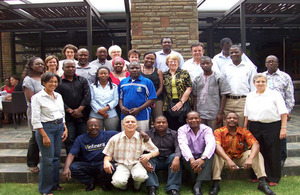DFID Research: Training health policy-makers, practitioners and researchers to access and use systematic reviews
In partnership with national bodies, the Centre for Evidence-based Health Care, Stellenbosch University, the South African Cochrane Centre and the Liverpool School of Tropical Medicine are delivering advanced courses for people involved in health policy and research to help them access, understand and use systematic reviews on the effects of healthcare interventions to inform their decision-making.

Course participants, Namibia 2012. Picture: Effective Health Care Research Consortium
The Cochrane Collaboration has made real advances in training and supporting individuals in low- and middle-income countries to prepare rigorous systematic reviews, but there are very few people in these regions trained to find, read and interpret the findings from them.
Using research in decision making is important for health policy makers; for clinicians to determine the best treatments for patients; and ultimately for the public to know what is best. Researchers also need to understand what existing research says to inform research questions and the design of new research. A policy maker, clinician or researcher with the ability to find, appraise, interpret and consider the findings of systematic reviews will increase the chances that these findings are used to make decisions.
Demand for these skills is slowly gaining momentum. In 2012, in response to requests, the Centre for Evidence-based Health Care at Stellenbosch University, the South African Cochrane Centre and the Liverpool School of Tropical Medicine designed and delivered a four-day course to staff from the Ifakara Health Institute, Tanzania and from the University of Namibia and the PolyTechnic of Namibia. The course, entitled ‘Primer in Systematic Reviews & Research Synthesis’, equips participants with the skills to access, assess, understand and use systematic reviews. The host institutions organised all aspects of the courses, apart from the teaching and materials. The course is accredited as a short course with the Liverpool School of Tropical Medicine and Stellenbosch University.
Using up-to-date, robust Cochrane Reviews as examples, participants learn how to phrase clear questions, find, understand, appraise and use systematic reviews of effects of healthcare interventions. Seminars and group work complement a dedicated online learning site that allows facilitators to interact with and support participants both during the course and also for a period of time after the course has finished. Participants can also support each other through this interactive medium. This approach is intended to help establish communities of practice that extend beyond the duration of the course, adding value to the learning activity.
Taryn Young, Director of the Centre for Evidence-based Health Care, Stellenbosch University and one of the course facilitators said. ‘To do this type of course requires commitment and we are finding that participants are rising to the challenge and recognising that the ability to find, understand and use systematic reviews is essential for evidence-informed decision-making’.
This is an activity of Effective Health Care RPC partners - Centre for Evidence Based Health Care, Stellenbosch, the South African Cochrane Centre (both based in Cape Town, South Africa) and the Liverpool School of Tropical Medicine, UK.
The South Asian Cochrane Centre & Network (EHCRC partner) also runs workshops on ‘Using Systematic Reviews in Evidence-Informed Healthcare and Health Policy’.